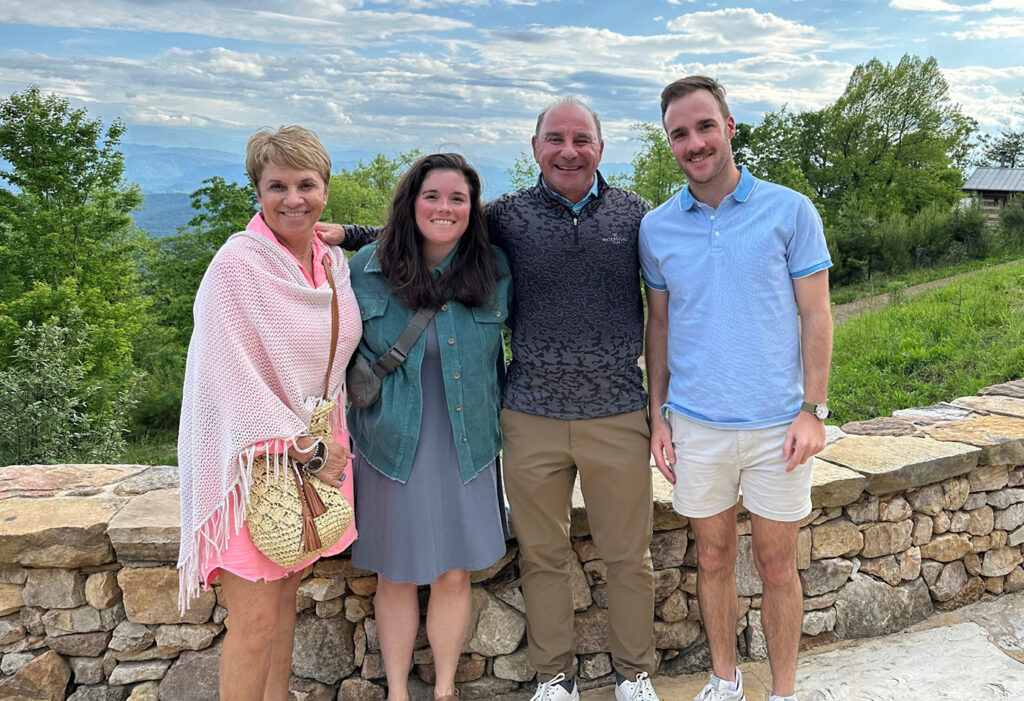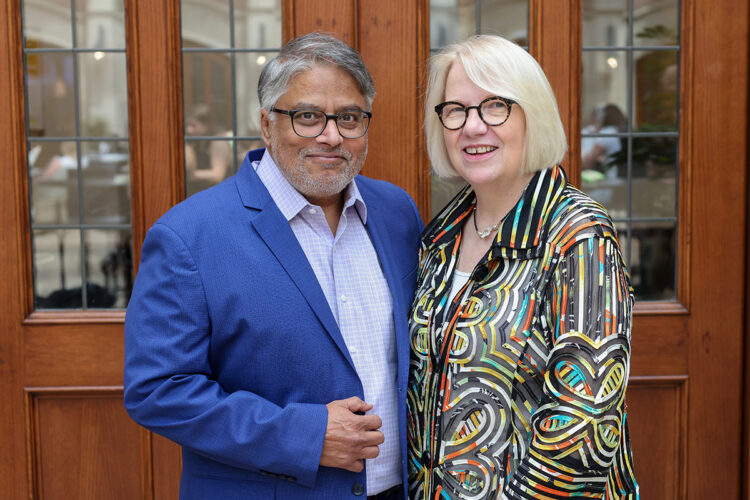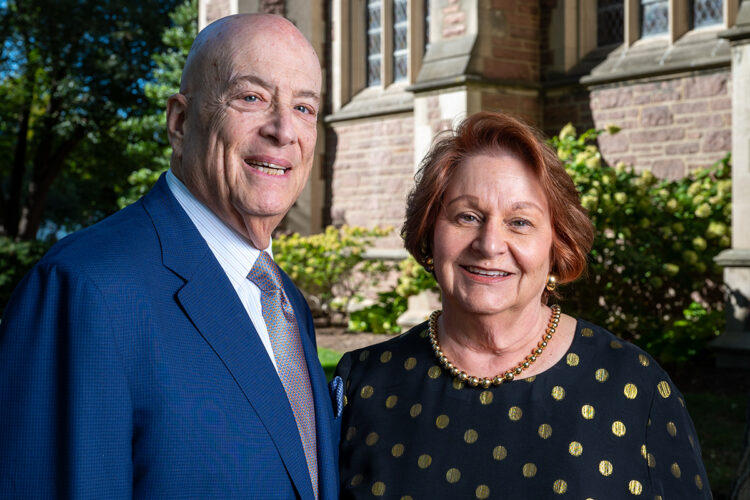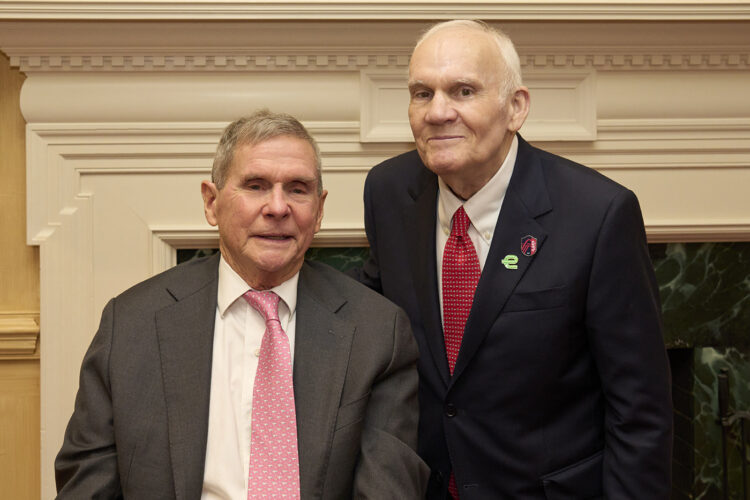For Howard Steinberg, AB ’83, MBA ’83, Washington University in St. Louis runs in the family. His father, Harold, and his uncle, Ben, both studied business at the university with assistance from the GI Bill. In 2013, he and his wife, Cynthia, became WashU parents when their daughter, Halle Steinberg, BSBA ’17, arrived on campus from the family’s home in suburban Atlanta.
The Steinbergs’ recent gift to the university, however, has roots in another family history: blood cancer. At the end of his junior year at WashU, Steinberg lost his father to a brain aneurysm triggered by medications used to treat multiple myeloma. About a decade later, his younger brother, John, was diagnosed with acute myeloid leukemia (AML) and underwent two bone marrow transplants. Howard served as the donor for both procedures. In 1994, John died at just 32 years old.
Now, Howard and Cynthia are helping advance research into these cancers by creating the Steinberg Family Cancer Research Fund through their family foundation, which includes their children, Halle, and John, who is named after Howard’s late brother. The spendable funding to WashU’s School of Medicine will support research led by Todd Fehniger, MD, PhD, a professor of medicine in the Division of Oncology and an investigator at the Alvin J. Siteman Cancer Center. The research fund provides Fehniger and his lab with minimum of $250,000 over five years. The first payment was received in March. The Steinbergs also made an additional gift of $50,000 to bolster Fehniger’s work, which focuses on understanding and treating AML and multiple myeloma.
“It is incredibly motivating to receive support from families like the Steinbergs who have firsthand experience with these difficult diseases,” Fehniger says. “Often, our ability to advance research is limited by our resources. Every dollar helps push us further toward curing more patients in the future. I am truly thankful for the Steinbergs’ generous gift to support research into developing new treatments for these diseases.”
A promising start
Over the years, the Steinberg family has supported cancer research at Seattle’s Fred Hutchinson Cancer Center, where Steinberg’s brother received treatment, and other institutions. But despite his connection to the university, Howard was less familiar with Siteman’s innovative approaches to treating blood cancers. That is until December 2021, when he came across an article about an encouraging new immunotherapy that leverages the immune system’s own natural killer (NK) cells to address recurrent AML in children and young adults. Four of the eight patients participating in the phase 1 clinical trial conducted at the School of Medicine reached total remission after 28 days of therapy. Two of these patients stayed in remission for more than three months — one remains in remission over four years later.
These results built upon earlier findings in adult patients made by Fehniger’s lab. In their original study from 2016, Fehniger and his team devised a method to enhance a patient’s NK cells by exposing them to a specific protein cocktail. The researchers observed that exposure to this mixture activated a “memory-like” quality in the NK cells, which increased their ability to attack cancers such as AML in adults.
Intrigued by their discovery, Steinberg arranged a call with Fehniger in early 2022 and was impressed by their interaction. “I just thought he was an absolute rock star,” he says. “And I wanted to help make his work more successful.”
The business of research
When Steinberg entered WashU in 1978, he was on a path toward medical school. But like legions of premedical students before him, he hit a wall with organic chemistry. “I still have nightmares about ‘Benny the benzene ring,’” he jokes. Steinberg eventually pivoted to studying psychology and business and earned an MBA through Olin Business School’s 3-2 dual degree program.
In the 40-plus years since he graduated, Steinberg, along with his business partners, has built a thriving rental car and truck franchise in seven cities. A seasoned entrepreneur, Steinberg recognizes that moving the dial in cancer treatment is an enterprise that requires consistent capital. He sees his family’s new research fund as an angel, or early-stage, investment in Fehniger’s promising research. “Often when investing, you are betting as much on a person as you are on a concept,” Steinberg says. “That’s what our family is doing here. Dr. Fehniger does not have to write a paper or submit an application. The money is there for him to use at his discretion and support his efforts.”
Unrestricted funds like these provide critical fuel for scientific discovery, according to Fehniger. “There is a real gap in our current funding system,” he explains. “You need considerable preliminary data to compete for grants from the National Institutes of Health and many major nonprofits, which takes years to obtain. Multiyear support like this gives us much-needed flexibility to ask questions, explore different paths, and gather additional information. And that enables us secure larger grants and continue our research while making rapid progress.”
New directions
Support from the Steinbergs is already helping propel Fehniger’s work with NK cells forward. He recently completed a clinical trial testing NK cell immunotherapy in children and young adults who had relapsed after undergoing allogeneic bone marrow transplants, which use stem cells from donors. Fehniger says the new study upheld results from the earlier clinical trials, and half of the participants achieved complete remission. Earlier this year, his collaborator, Thomas Pfeiffer, MD, assistant professor of pediatrics, presented their findings at a meeting of the American Society of Transplantation and Cellular Therapy, and they are now preparing a manuscript for publication.
“It is incredibly motivating to receive support from families like the Steinbergs who have firsthand experience with these difficult diseases. Often, our ability to research is limited by our resources. Every dollar helps push us further toward curing more patients in the future.”
Todd Fehniger, MD, PhD
Fehniger has also been able to experiment with chimeric antigen receptors (CAR), synthetic receptors that help identify and destroy cancer cells. With resources from the fund, he has generated several CARs, adding them to the NK cells to create modified CAR-NK cells. According to him, the CAR-NK cells can see and attack AML and multiple myeloma better than the NK cells alone.
In January 2024, the Leukemia & Lymphoma Society awarded a $5 million grant to Fehniger and a group of investigators at the medical school. He and fellow oncologist Brad Kahl, MD, professor of medicine, will use their portion of the grant to further study the effectiveness of genetically engineered NK cell immunotherapy in treating blood cancers. In addition, he and another colleague, Amanda Cashen, MD, professor of medicine, will explore NK cell immunotherapy through one of four projects funded by a recent $10.8 million grant from the National Cancer Institute that renews the medical school’s Specialized Program of Research Excellence in leukemia led by principal investigator Dan Link, MD.
“Support from donors like the Steinbergs has really allowed us to test new approaches, including these modified CAR-NK cells, and get a better grasp on how different cells behave in patients,” Fehniger says. “And we have been able to leverage that information to pursue additional funding.”
For his part, Steinberg appreciates receiving regular progress updates from Fehniger, even if his communications require some translation. “I keep telling him, I’m a rental car guy,” he says. “You have to simplify it for me!”
Paying it forward
Steinberg’s relationship with Fehniger marks yet another chapter in his family’s legacy of leadership and philanthropy at WashU. He is a member and past chair of the Atlanta Regional Cabinet and sits on the national council of the Skandalaris Center for Interdisciplinary Innovation and Entrepreneurship. He previously served as a member and vice chair of the Alumni Board of Governors.
He and Cynthia are generous donors as well. In 1997, the couple established and later endowed the Regina Karmel Memorial Scholarship, named in honor of Howard’s grandmother, for undergraduates studying economics or business. In 2000, they created the Harold and John Steinberg Memorial Nursing Scholarship Fund for nurses and advanced practice nurses working in the Division of Oncology.
When daughter Halle joined the Bears softball team, the Steinbergs became steadfast supporters of WashU athletics. They have also previously made gifts for internships at the Skandalaris Center and research at Siteman Cancer Center.
Their latest gift to the university is particularly special because it is the first made through their newly formed family foundation. “We’re so lucky to be able to give back to WashU,” Howard says. “It’s truly a blessing.”
Learn more about how you can support research and patient care at WashU’s School of Medicine.



